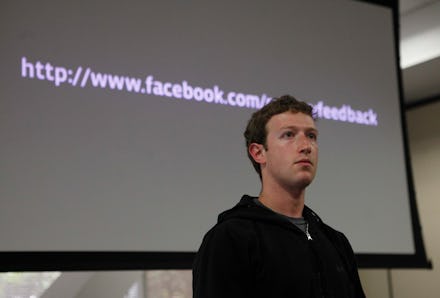"There isn't a neutral position on racism": Why Facebook employees are irate at Zuckerberg

As Twitter continues to flag President Trump’s tweets for disinformation and hide others behind notes about glorifying violence, Facebook has taken a decidedly hands-off approach to his content. In a glaring contrast between the two platforms, Mark Zuckerberg has refused to label or moderate the president’s posts, leading to public unrest among Facebook’s employees at various levels throughout the company. On Monday, that anger culminated in a virtual walkout.
While the country burns in the wake of George Floyd’s murder by a Minneapolis police officer, the president has opted against any attempt at de-escalating the situation. Instead, he has posted inflammatory messages targeting protestors, labeling them as “THUGS” and quoting a 1967 police chief who targeted Black Americans during the civil rights movement by stating, “when the looting starts, the shooting starts.” He has also threatened to unleash “the most vicious dogs” and “the most ominous weapons” against demonstrators outside the White House.
Twitter has responded by flagging Trump’s ‘looting starts, shooting starts’ tweet with a warning informing readers that it violates Twitter’s rules against glorifying violence. The company “determined that it may be in the public’s interest for the Tweet to remain accessible,” according to the flag, but users have to click to fully view the post and cannot ‘like’ or reply to it.
Facebook, by contrast, has left the president’s posts untouched, and Zuckerberg has been vocal about the company’s decision.
“We’ve been pretty clear on our policy that we think that it wouldn’t be right for us to do fact checks for politicians,” he said last week during a Fox News interview after Twitter's decision to flag posts from the president containing false information about mail-in ballots. “I think in general, private companies probably shouldn’t be — or especially these platform companies — shouldn’t be in the position of doing that.”
The same philosophy was on display when Facebook left the president’s ‘looting starts, shootings starts’ message as-is, ostensibly in the name of public interest.
“I know many people are upset that we’ve left the President’s posts up,” Zuckerberg wrote in a Facebook post on May 29, “but our position is that we should enable as much expression as possible unless it will cause imminent risk of specific harms or dangers spelled out in clear policies.” He continued to explain that “[although] the post had a troubling historical reference, we decided to leave it up because the National Guard references meant we read it as a warning about state action, and we think people need to know if the government is planning to deploy force.”
Zuckerberg and his team ultimately decided that “[the company’s] policy around incitement of violence allows discussion around state use of force” and insisted that they would have taken action if the post was encouraging people to attack protesters. “Unlike Twitter, we do not have a policy of putting a warning in front of posts that may incite violence because we believe that if a post incites violence, it should be removed regardless of whether it is newsworthy, even if it comes from a politician.”
But this stance has become the last straw for some employees.
“I don't know what to do, but I know doing nothing is not acceptable,” wrote Jason Stirman, of research and development, on Twitter. “I'm a FB employee that completely disagrees with Mark's decision to do nothing about Trump's recent posts, which clearly incite violence. I'm not alone inside of FB. There isn't a neutral position on racism.”
“Facebook's inaction in taking down Trump's post inciting violence makes me ashamed to work here,” wrote software engineer Lauren Tan on Twitter. “I absolutely disagree with it. [...] Silence is complicity.”
“Mark is wrong,” wrote Ryan Freitas, director of product design, “and I will endeavor in the loudest possible way to change his mind.”
Employees’ public criticism of the company is rare for Facebook, which makes the virtual walkout especially notable. Some have vowed to use their power within the company to fight against the decision; others told The New York Times that they threatened to quit if Zuckerberg refused to change his mind. Facebook has responded to the unrest by moving Zuckerberg’s weekly meeting with employees to Tuesday, instead of its usual Thursday time, to hear out its employees. Zuckerberg also pledged $10 million to racial justice groups, though he did not detail which groups in his Facebook post on Monday.
“To help in this fight, I know Facebook needs to do more to support equality and safety for the Black community through our platforms,” he wrote. “As hard as it was to watch, I'm grateful that Darnella Frazier posted on Facebook her video of George Floyd's murder because we all needed to see that. We need to know George Floyd's name. But it's clear Facebook also has more work to do to keep people safe and ensure our systems don't amplify bias.”
A Facebook company spokesperson told Mic, “We recognize the pain many of our people are feeling right now, especially our Black community. We encourage employees to speak openly when they disagree with leadership. As we face additional difficult decisions around content ahead, we'll continue seeking their honest feedback.” The company also said it acknowledges and supports the employees who have decided to take part in the virtual walkout, and will not take away paid time-off from the participants.
Time will tell whether the meeting with employees will be enough — otherwise, the company’s ongoing lack of diversity and accusations of bias against black employees, in addition to its current stance on President Trump’s tweets against Black Lives Matter protesters could be a demoralizing blow to employees that will be remembered long after the unrest ends.